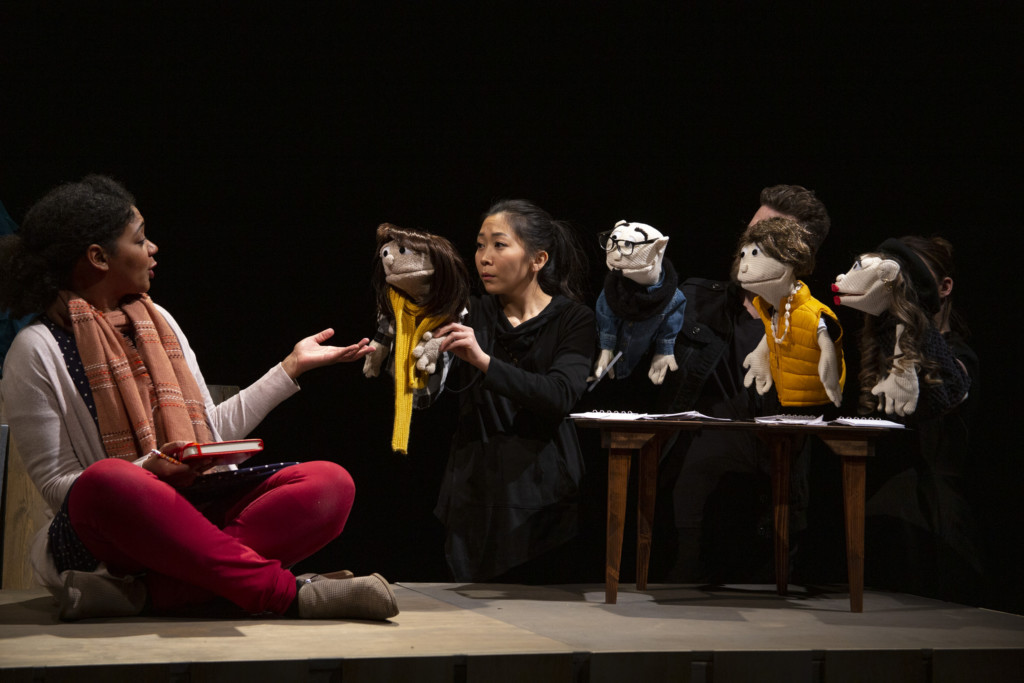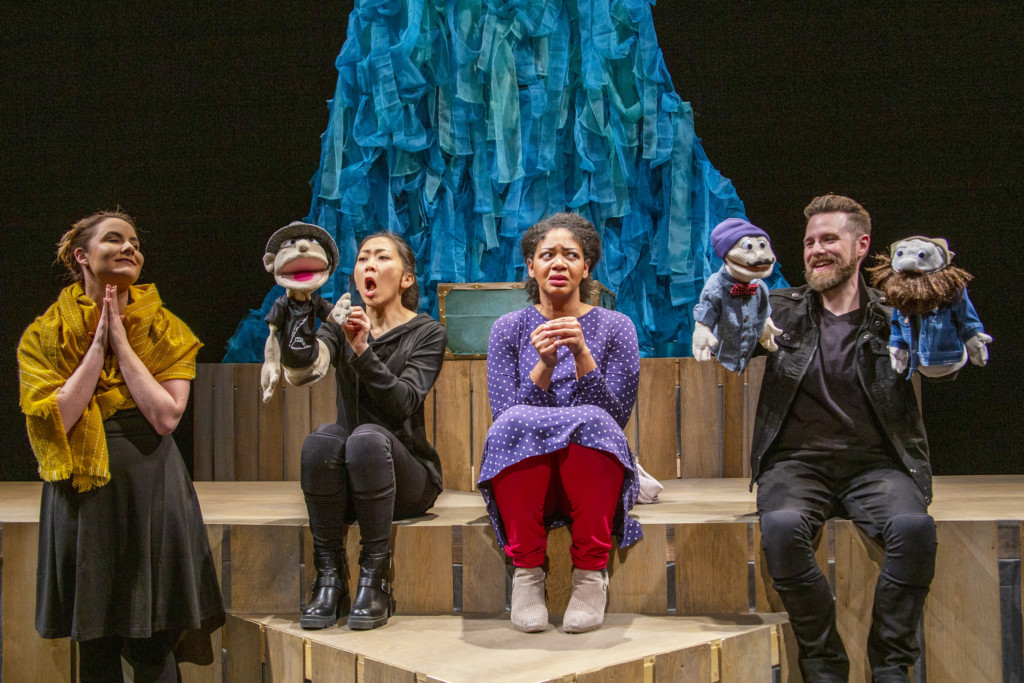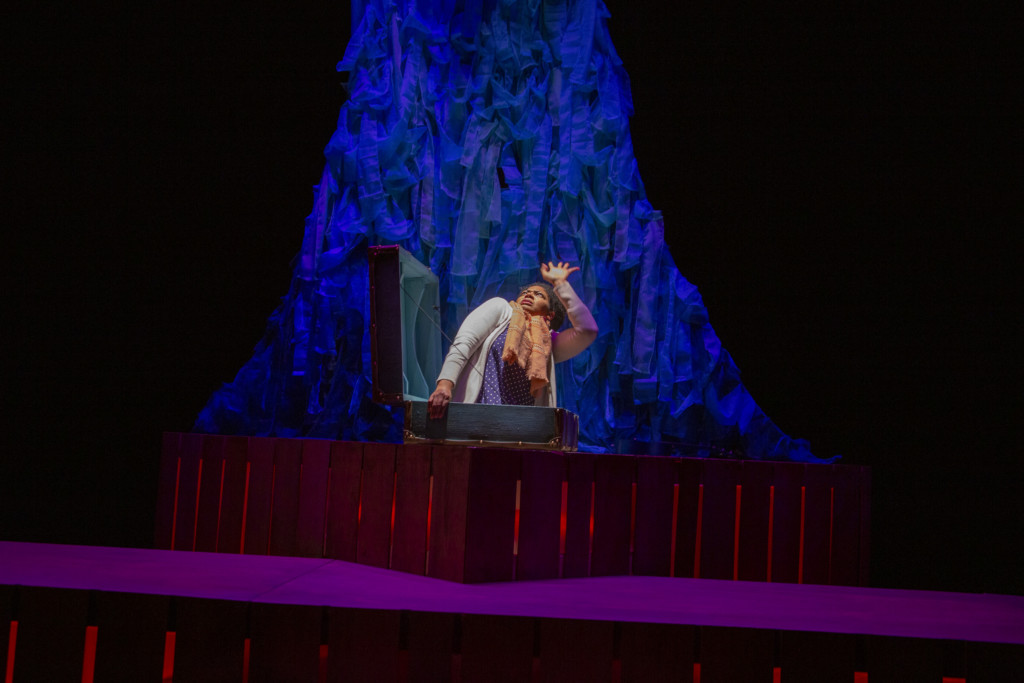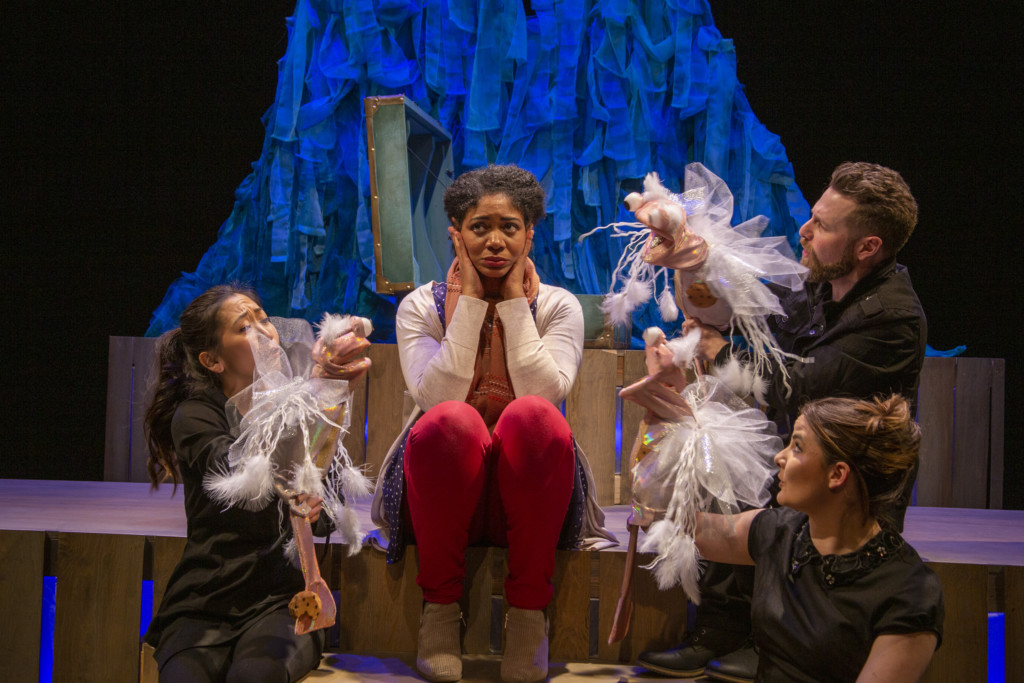Any “confident-sized” playwright would have envied the spectacular opening of Plan-B Theatre’s premiere of Jenny Kokai’s Singing to the Brine Shrimp, directed by Jason Bowcutt. The rhythm was sharp, precise and natural in a brilliantly written comedy with a smart set of songs. It is the model marriage of aquaculture and the theatrical arts.
Perhaps the biggest takeaway from this show is directed to any creative artist who worries that being in Utah (with its full set of oddball luggage) might limit their opportunities to break through so they consider going to the hubs of the coastal metroplexes for validation and artistic legitimacy. A recurring theme in this publication’s coverage of original work in Utah’s arts and culture scene emphasizes just how creative producers are punching successfully well above their weight class in this state with a population approaching 3.25 million and generating a body of work that would be esteemed in any locale and worthy of staging.

Kokai draws in part from her professional experiences in setting the story of Allison (Latoya Cameron), a 35-year-old playwright from Utah who also works as an administrator for a nonprofit theater education organization. On one hand, Allison is excited by the prospects of gaining attention for her work at an event in New York City but her confidence also is rattled, when she meets the other playwrights and, especially, the director and cast selected to rehearse and perform her play. The experience portends to be a failure and Allison’s anxiety is heightened by news from her spouse Dinah in Utah. Her son was injured in an auto accident and their dog is missing. Dinah always defers to Allison in a crisis and the playwright wonders if she should just cut her losses and return to Utah. And, drinking cheap wine helps only so much.
Kokai’s ingenious take on this story line couples nicely with Plan-B’s expertise par excellence in extracting as much entertainment oomph from minimalistic staging with versatile sets and props. As previously mentioned at The Utah Review, three of the four actors in the cast (Emilee Starr, Jay Perry and Lily Hye Soo Dixon) take on numerous roles in the play, with the help of sock puppets created by Shelby Rickart of Puppets in the City. The puppets precisely convey Kokai’s character descriptions including the group of playwrights whose success and peerage intimidate Allison as well as the director and actors who savage Allison’s script, which happens to include brine shrimp.

Two actors also take up supporting character roles such as Dinah, Allison’s spouse (Starr); Bianca, a visibly over-caffeinated New York theater producer (Starr); Lorina (Dixon), a dramaturg who is unhelpful and has her sights aimed instead at more successful writers and Beth, a theater agent who quickly dashes Allison’s hopes without uttering a single encouraging word (Starr).
The trio of brine shrimp (Dixon, Perry and Starr), portrayed with uber-cute sock puppets, pop out in ultra-magnified scope, far exceeding their actual size of less than a half inch. They offer Allison the support she needs to endure the outcomes of her own lack of confidence and awkwardness. With Allison playing on a ukulele, they sing and they are not shy about being honest with her. Ken Plain wrote music for the songs that sparkle with the utmost fidelity to Kokai’s lyrics and story line. The Brine Shrimp Quadrille Song shines, in particular. The brine shrimp sing,

They don’t see you as an author and your success is growing slighter
You’re caught up in your head and you never will advance
You can’t accomplish anything if you never even take a chance
Allison responds:
This is something I have wanted my entirety of life
I’ve always been a writer through the turmoil and the strife
But I’m scared to look an amateur so I’m scared to even try
I’ve accomplished absolutely nothing and the end is drawing nigh
I would not could not would not could not would not take a chance
I would not could not not in this circumstance
Allison, who tells her dramaturg, that she wants to be a “confident-sized writer,” seesaws between being too scared that people will see her as an amateur and reasserting herself as a good writer in confronting Royston, the director who is barely invested in giving even one whit of acknowledgment to Allison’s writing and its meaning. The brine shrimp encourage Allison but they also are helpful only up to a point: “We’re shrimp, so we’re not really in a place to evaluate that claim.”

There is not a slack moment in the production. The cast thrives on the comedic chemistry and the ensemble is in theatrical heaven. The funniest scenes occur in the dialogue between Allison and the sock puppets: the first reading of her script with the director and actors and a scene with the other playwrights at a bar with dance music and flashing lights to boot. Plain’s musical underscoring for the play enriches the comedic flavor.
The rip-roaring humor never eclipses the heart of the epiphany in this production. Kokai’s play also takes the audiences behind the scenes in the creative process which often is frustrating as it is magical. The probabilities of incompetence, disagreement, conflict of creative decision making and inflated egos and puffed-up reputations sometimes are equal to or greater than the probability of finding the right zone of achieving magic in all of the moving parts needed to stage a new work. Playwrights tend to be nervous creatures, ceaselessly questioning whether or not they deserve to be confident. And, one can understand those feelings if one encounters, say, a self-aggrandizing character actor who has played five different versions of a clerk in the Law and Order television series but insists that he knows what’s best for his role.
And, happily in some cases, there are synergies such as those that make Singing to the Brine Shrimp such a magical show. Kokai graciously acknowledges the fortune of having a team comprising producer, director, actors, dramaturg and technical crew where everyone is committed to excellence in their respective professional roles. The resulting magic is just as satisfying – maybe even more so – in a Salt Lake City premiere as it might be in New York.

Rounding out the production crew are Cheryl Cluff, sound; La Beene, costumes; Jessica Greenberg, lighting; Madeline Ashton, set; Arika Schockmel, props; Gina DiSalvo, dramaturgy, and Jennifer Freed, stage manager.
Performances continue through Feb. 23, on Thursday, Friday and Saturday (Feb. 20- 22) at 8 p.m., Saturday (Feb. 22) at 4 p.m. and Sunday (Feb. 23) at 2 p.m. in the Studio Theatre at the Rose Wagner Center for Performing Arts in downtown Salt Lake City.
For tickets and more information, see the Plan-B Theatre website.
